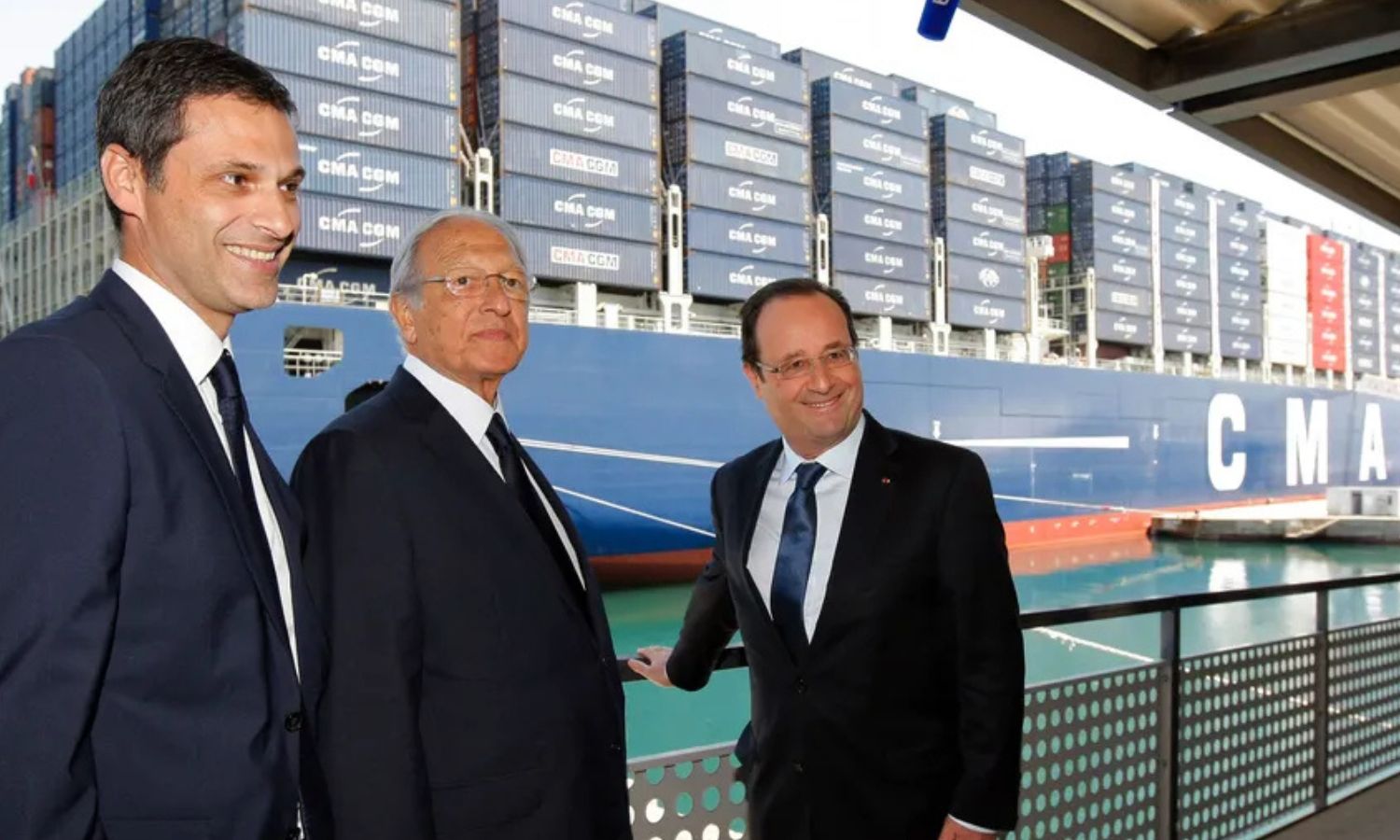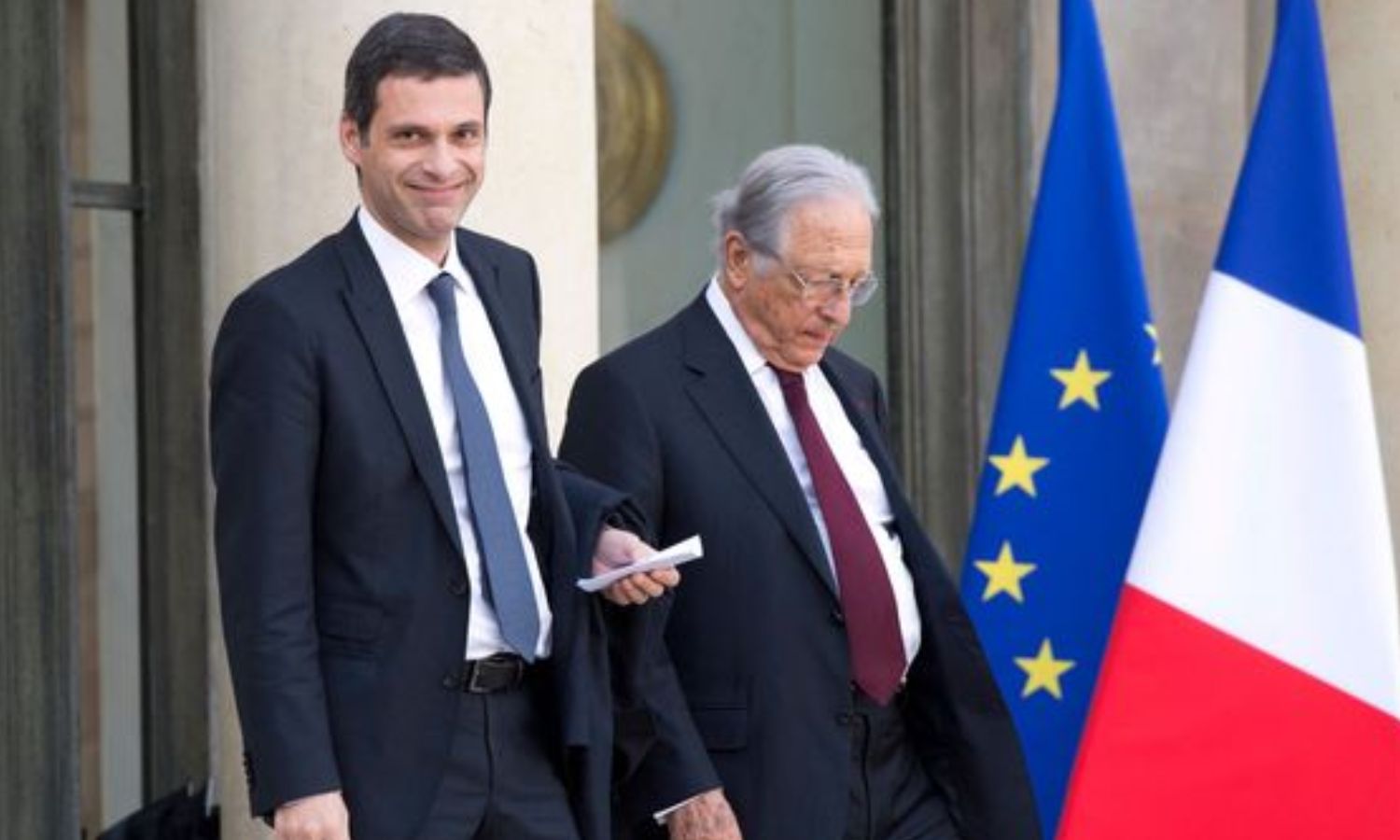



Enab Baladi – Ali Darwish
Syria and Lebanon have remained central to Jacques Saadé’s plans, the founder of the giant shipping company “CMA-CGM,” since its first appearance in the French city of Marseille in 1978 until the company obtained investment contracts at the ports of Latakia, Beirut, and Tripoli.
The return of Jacques Saadé and his heir in managing the company, his son Rodolphe, to invest in Syria and Lebanon came after they accompanied French presidents during visits to these countries, reflecting the political influence of the family alongside its economic strength.
The CMA-CGM group continues to seek expansion and renew its contracts in Syria and Lebanon, despite the political, military, and economic tensions that have plagued Syria since 2011, as well as the Lebanese economic crisis since 2019 and the infiltration of the Lebanese Hezbollah into the state (and necessarily Iran), followed by the Israeli war.
Rodolphe became the CEO of his father’s group in 2017, continuing to expand the empire of his father Jacques, who passed away in June 2018.
Jacques Saadé is Franco-Lebanese, from a bourgeois family with a father from the coastal city of Latakia in western Syria and a Lebanese mother. He moved to Lebanon in 1970 due to nationalization decisions issued by the Baath Party after seizing power in Syria.
The Lebanese Civil War forced Jacques to travel to France and settle in Marseille, where he began building his empire, having established the company “Compagnie Maritime d’Affrètement” (CMA) in 1978 with four employees, one ship, and just one shipping route between Beirut, Latakia, Livorno, and Marseille.
The development of the company over 46 years has enabled it to transport over 21 million TEUs (Twenty-foot Equivalent Units) annually across different continents, operating 45 terminals, with a fleet of 623 ships of various sizes, totaling three million standard containers, according to its official website.
In March 2021, the company launched an air freight line with four cargo planes through “CMA CGM Air Cargo” and later announced the purchase of two more planes, with plans for an additional four planes to join its air fleet, thus enabling it to provide land, sea, and air shipping services.
Jacques and Rodolphe Saadé have established relationships with politicians in France. According to an investigation conducted by Radio France in September, one of these connections was with French Defense and then Foreign Minister Jean-Yves Le Drian (now Emmanuel Macron’s personal representative in Lebanon), who played a role in the rapprochement between Macron and Rodolphe Saadé.
Former French President François Hollande (2012-2017) also had a friendly relationship with Jacques Saadé, helping the company in 2013 to overcome its financial crisis that began in 2009 and led towards bankruptcy.
According to Dominique Bussereau (Minister of State for Transport for five years during the terms of Jacques Chirac and Nicolas Sarkozy, then a board member), French Presidents François Hollande, Jacques Chirac, Nicolas Sarkozy, and Emmanuel Macron have all shown interest in Jacques Saadé’s company.
Bussereau indicates the strategic importance of the Saadé shipping empire for a nation like France, which could potentially seize commercial maritime assets in times of military crisis, similarly to what Margaret Thatcher did during the Falklands War. Moreover, Rodolphe Saadé has served the state or local authorities.

Jacques Saadé and his son Rodolphe leaving the Élysée Palace after meeting with President François Hollande – March 7, 2014 (AFP)
The development and acquisition over the years witnessed by CMA company eventually brought Jacques Saadé back to his hometown of Latakia through the economic avenue. This was not coincidental, as he was part of the delegation accompanying former French President Nicolas Sarkozy during his visit to Syria in September 2008.
Jacques was in the delegation alongside Christophe de Margerie, CEO of the oil company “Shell,” which directly obtained a renewal contract in Deir Ezzor, according to the French Le Figaro newspaper.
As for Jacques, he secured his investment after about five months, signing with the General Company for the Port of Latakia in February 2009, a contract with his company “CGM-CMA,” the company “Terminal Link,” and “Syria Holding,” to manage the Container Terminal at Latakia Port for ten years, renewable for another five years with the agreement of both parties.
The company “Terminal Link,” specializing in the investment, development, and operation of ports, is present in 16 countries across four continents, headquartered in Marseille, and is owned 51% by CMA CGM and 49% by the state-owned China Merchants Port Holding Company Ltd, according to the company’s official website.
The three investing companies later established the Lattakia International Container Terminal (LICT) as a Syrian limited liability company to manage and implement the management and operation contract for the container terminal, commencing operations on October 1, 2009.
According to the contract, the investments by the operating party totaled $45.9 million, including $6.2 million for maintenance and rehabilitation of infrastructure at the terminal and $6.2 million for equipment that was to revert to the port authority after the contract expiry.
The terminal covers an area of 33.38 hectares in the first phase, featuring four docks and twelve refrigerated container berths, as well as four wharf cranes, five mobile cranes, 26 straddle carriers, 17 forklifts, and 55 terminal tractors.
The Syrian government established the Port of Latakia Company, a joint public-private sector entity, in 1950 according to Legislative Decree No. 38, which aimed at establishing and investing a maritime port in Latakia with its associated facilities.
The company came under the Ministry of Transport in 1974 and was later transformed into a public entity under Law 17 in 1982.
The port consists of two parts: the first is the Latakia International Container Terminal (LICT), currently managed by “Terminal Link,” while the second is the General Company for the Port of Latakia, which supervises public employees, laboratory tests, and equipment.
The renewal of CMA-CGM’s contract was delayed until the summer of 2020 (it was supposed to be renewed in 2019 with both parties’ consent), which specialized analyses attributed to Iranian desires for the investment versus Russian refusal, resulting in a Russian outcome at the expense of Iranian ambitions.
According to the Al-Araby Al-Jadeed newspaper, a government official at Latakia Port reported that the investment share for the French company was amended to 99%. This was followed by adjustments to the board of directors and the incorporation of executives from their staff.
CMA-CGM continued its operations amidst the Syrian revolution, despite the regime facing Western and American sanctions for employing violence against peaceful protests.
The continuous operations despite sanctions exposed the company to risks of sanction violations. However, as noted by economic researcher Karam Shaar in his monthly newsletter on the Syrian economy, the main factor for the company’s resilience was its capability of managing sanctions, making it the largest Western company to continue operations in Syria.
Shaar also pointed out that the “close relationship” connecting the company with the French government, especially the presidency, provided it with additional advantages and reduced the risk of punitive measures against it.
The first renewal was followed by a second renewal last October, which deprived Iran, which had sought to acquire Latakia Port over recent years in return for the military, political, and economic support it provided to the Syrian regime, a status similar to its rival and ally in Syria, Russia, which has control over the port of Tartus.
Economic journalist Iyad al-Jaafari described the renewal process as a setback for Iran’s dream of linking “the crown jewel of their imagined Silk Road,” thereby achieving its goal of establishing a trade route from its territory via Iraq and the Syrian desert, reaching the Syrian coasts, and gaining access to the Mediterranean.
Al-Jaafari noted, in an article for al-Modon news website, that there exists an Israeli “veto” on Iranian influence at the port, which began in 2019, noting that the port has been subjected to Israeli bombardment several times. Attempts by former Iranian President Ibrahim Raisi during his 2023 visit to Syria to secure the port were also unsuccessful.
The regime compensated Iran by agreeing to allocate a portion of the port’s revenues to repay part of its debts, according to leaked official documents from an Iranian opposition group that hacked into the Iranian presidency’s private servers in 2023.
The political characterization of the company’s contract renewal, according to al-Jaafari, represents “stability for the French foothold on the Syrian coast, thus allowing Bashar al-Assad to slightly evade Iranian control while maintaining his various threads with other international and regional powers.
Jacques Saadé began his investment in Latakia after accompanying Sarkozy, and his son Rodolphe returned to Lebanon after accompanying French President Emmanuel Macron during his visit to Lebanon in August 2020 following the Beirut port explosion.
The family’s investments in Syria, as visible, did not exceed the Latakia port, whereas in Lebanon, they have transformed into a quasi-economic empire in various sectors, primarily ports (Tripoli and Beirut).
Rodolphe Saadé’s economic influence expanded in Lebanon, and he began holding meetings with Lebanese economic bodies to discuss investment horizons, one of which was in June last year.
Enab Baladi could not confirm the existence of Saadé family’s investments in Lebanon prior to Rodolphe and Macron’s visit, but Jacques Saadé held the presidency of the Lebanese-French Chamber of Commerce from 1986 to 2014, according to the “Manhom” website.
According to an investigation by Daraj Media titled “Port of Beirut Suspicious Tender: French Company Bids Against Itself, Wins by Acclamation,” and an article by economic journalist Azza Hajj Hassan on the Lebanese website “al-Modon,” Rodolphe’s investments expanded after the visit:
Jacques Saadé passed away on June 24, 2018, at the age of 81, and his son Rodolphe had become the CEO of the company in 2017.
The Saadé family is known among the notable bourgeois families in Latakia, and Jacques’s father (Rodolphe the grandfather) had investments in several sectors in Syria. Jacques left Syria due to the nationalization decisions issued by the Baath Party.
As per the company’s official website, it all began in 1978 with a company called “Compagnie Maritime d’Affrètement,” consisting of four employees and one ship with a single shipping route between Beirut, Latakia, Livorno, and Marseille.
The idea of using steel shipping containers for transporting goods, given their increased safety, efficiency, and flexibility, was “inspired” by founder Jacques Saadé from the steel boxes used by the US Department of Defense at that time for shipping clothes and equipment to its forces.
The company added a new service to its shipping routes to include North America after purchasing two ships, becoming a rapidly growing startup by 1986.
Over the following ten years, it entered a new phase that involved signing commercial agreements with major shipping companies serving the Red Sea route (from China to Egypt) in 1987 and opening offices in Asia, notably in Shanghai in 1992, launching the France-Asia Line (FAL) in 1994.
The company’s development included various aspects, including acquisitions starting in 1996, the most notable of which were:
if you think the article contain wrong information or you have additional details Send Correction